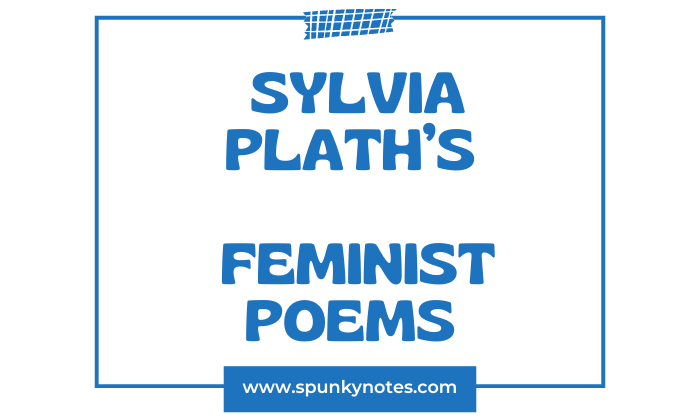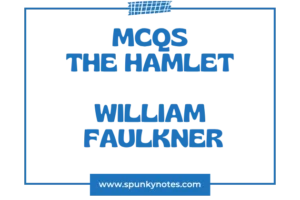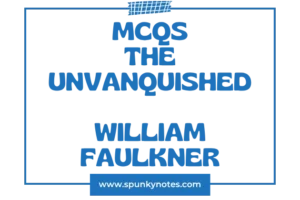

Estimated Reading Time: 8 min
Q. How did Sylvia Plath’s poems influence the contemporary feminist movements, and in what ways does her work remain relevant to feminist discourse today?
Q. Critical Analysis of Sylvia Plath’s Feminist Poems.
Introduction
Sylvia Plath is a widely recognized feminist writer. She has made significant contributions to the feminist movement through her works.
Sylvia Plath’s Feminist Poems represent women’s experiences and feminist issues. Plath’s poetry often explores themes of female oppression, patriarchy, identity, power, and mortality.
Confessional Poetry
Firstly, Plath’s confessional poetry is relevant to feminist discourse. She openly shows her struggles with depression. Plath’s writing often deals with themes of isolation and despair.
She bravely tackled tough subjects, which helped to make mental illness less scary. This has encouraged other writers, especially women, to do the same.
Patriarchal Power
Secondly, Plath’s feminist perspective can also be seen through how she challenges the patriarchal power structures. Plath’s writing shows how men exert control over women.
It can be through societal expectations, romantic relationships, or other means. She was influential in feminist movements that sought to challenge and dismantle systems of oppression and inequality.
Femininity and Female Identity
The women struggling to reconcile their desires and ambitions with the expectations placed on them by society are the subject of Plath’s poetry. This inspired many feminists to question and challenge traditional gender roles.
Feminist Analysis of Sylvia Plath’s Poems
This discussion examines how Sylvia Plath’s writing has affected feminism today and why her work is still important from a feminist perspective. The analysis of Sylvia Plath’s Feminist Poems includes:
- The Applicant
- The Arrival of the Bee Box
- Ariel
- Lady Lazarus
- Daddy
The focus will be on the textual evidence that supports a feminist viewpoint.
Feminism in the Poem The Applicant
Sylvia Plath’s poem “The Applicant” critiques societal norms and gender roles, a literary embodiment of feminism.
Plath employs a mocking, sardonic tone to depict the woman as an object, specifically a domestic appliance, implying that women are valued mainly for their functionality in the domestic sphere.
The speaker in the poem, presumably a man, speaks directly to an “applicant,” presumably another man, about a potential wife.
First, are you our sort of a person?
The opening line immediately sets the scene of scrutiny, as if applying for a job. Plath uses this metaphor to highlight how women are ‘chosen’ or ‘rejected’ based on superficial or archaic criteria.
The woman is compared to a ‘living doll’, stripped of agency, a mere puppet designed to fulfill domestic duties:
A living doll, everywhere you look. It can sew, it can cook.
The use of ‘it’ here objectifies the woman, highlighting the feminist theme of a woman as an object in a man’s world.
It can talk about things you like, to entertain you
This line further emphasizes the commodification of women in society. They are sources of pleasure and entertainment for men. It reflects the feminist critique of the objectification and marginalization of women.
Will you marry it, marry it, marry it.
The darkly ironic ending is a culmination of Plath’s critique. The phrase ‘marry it’ is often used to highlight the belief that marriage is more like a business deal or a required duty instead of being built on love.
This shows a feminist point of view where marriage is seen as something that can hold people, particularly women, back or limit their freedom.
Feminism in the Poem The Arrival of the Bee Box
In “The Arrival of the Bee Box,” Sylvia Plath uses vivid imagery to explore female power and autonomy themes. The poem portrays the bee box as a symbol of female sexuality and creativity.
In the poem, the speaker receives a box of bees and describes the fear and excitement that comes with the responsibility of handling them. The bees are described as “furious” and “dangerous,” and the speaker knows her power over them.
However, by the poem’s end, the speaker proclaims,
Tomorrow I will be sweet God, I will set them free.
The box is only temporary.
Deciding to let the bees go free shows that the speaker wants to break from traditional roles and free herself from limits. It’s a strong message about women wanting to make choices and control their future.
The speaker starts a journey toward self-discovery and empowerment by releasing the bees. Therefore, Plath’s message encourages women to take control of their lives and explore their creativity without fear or inhibition.
Feminism in the Poem Ariel
In “Ariel,” Sylvia Plath writes about her own experience of personal transformation and empowerment. The poem portrays the speaker as a powerful and autonomous figure capable of overcoming the obstacles that have held her back in the past.
The speaker in the poem rides a horse, and riding a horse suggests a kind of unbridled power and energy. This poem shows women’s power and resilience. The speaker is a strong and independent figure.
The speaker identifies herself with traditionally masculine symbols of strength and aggression, such as “the arrow,” challenging the notion that women are inherently weaker or less powerful than men.
And I am the arrow
The line is a metaphor Sylvia Plath uses in her poem “Ariel” to describe the speaker’s sense of purpose and direction. In this metaphor, the speaker compares herself to an arrow, a weapon intended to aim at a specific target with great force and precision.
By identifying herself as the arrow, the speaker expresses her focused intention and determination to reach her goals.
The speaker criticizes the patriarchal systems that seek to suppress women’s power and autonomy. Therefore, she challenges the idea that women are weak or inferior to men by depicting the speaker as a powerful and autonomous figure.
Feminism in the Poem Lady Lazarus
In “Lady Lazarus,” Sylvia Plath describes herself as a kind of performance artist, capable of “dying” and returning to life repeatedly.
The poem also has grotesque imagery emphasizing the speaker’s power and resilience.
Dying
Is an art, like everything else.
I do it exceptionally well.
These opening lines suggest that the speaker takes control of her mortality and turns it into a performance. Moreover, this is a kind of revolt against the traditional feminine role of nurturer and caregiver.
Herr God, Herr Lucifer
Beware
Beware.
The repetition of “Beware” in these lines can be seen as a warning to the male-dominated society and patriarchal power structures that the speaker is challenging. By invoking God and Lucifer, the speaker also asserts her power and warns those seeking to suppress or control her.
Out of the ash
I rise with my red hair
And I eat men like air.
These lines depict the speaker as a powerful and unstoppable force. She is rising from the ashes of her previous deaths with her red hair as a symbol of vitality and strength.
The phrase “eat men like air” can also be interpreted from a feminist perspective, suggesting that the speaker can consume and dominate men as easily as she breathes.
Feminism in the Poem Daddy
In “Daddy,” Sylvia Plath uses vivid and sometimes disturbing imagery to highlight female oppression and patriarchy.
Sylvia Plath’s feminist poem, Daddy, depicts the speaker’s father as an authoritative figure. He exerts power over her even after his death. Moreover, it highlights the speaker’s complicated relationship with him.
You do not do, you do not do
Any more, black shoe
In which I have lived like a foot
For thirty years, poor and white,
Barely daring to breathe or Achoo.
These lines suggest the speaker’s entrapment within traditional gender roles, where her imprisonment is like a foot in a shoe. The colour “white” implies a lack of power and privilege in society, while “barely daring to breathe” suggests the speaker’s feelings of suffocation and oppression.
Daddy, I have had to kill you.
You died before I had time–
Marble-heavy, a bag full of God,
Ghastly statue with one gray toe.
The speaker’s declaration that she has had to “kill” her father can be seen as a feminist rejection of patriarchal power structures. The image of her father as a “ghastly statue” suggests the oppressive weight of male authority and control.
I was ten when they buried you.
At twenty I tried to die
And get back, back, back to you.
I thought even the bones would do.
The speaker’s longing for her father criticizes the societal expectation that women should depend on men for emotional support and validation. Her desire to “get back” to her father, even in death, implies a desire for independence and agency.
Daddy, daddy, you bastard, I’m through.
The speaker’s final line is a feminist assertion of power, as she rejects her father’s hold over her. She declares herself “through.”
The word “through” suggests that the speaker has reached a point of resolution. She is finally moving beyond her father’s control and influence. By declaring herself “through,” the speaker finally rejects her father’s power over her and asserts her independence.
Hence, from a feminist perspective, it represents the speaker’s refusal of the patriarchal structures that have shaped her life.


